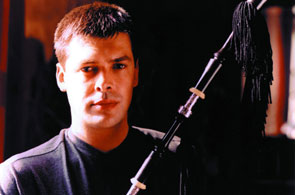| B i o g r a p h y |
 José Ángel Hevia Velasco
was born in Villaviciosa, Asturias in 1967 He first came into contact
with the bagpipes when he was four years old during a procession in
Amandi when he was with his grandfather. It was there that the image of
a man and his bagpipes had and impact on the very young José
Ángel. The unity between the pipe player,his music and the
instrument seemed magical to him. Hevia then began bagpipe
classes.three times a week, after school, he took the bus to Gijon.
Armando Ferdandez taught him in the traditional style and then
accompanied him back to the bus.
José Ángel Hevia Velasco
was born in Villaviciosa, Asturias in 1967 He first came into contact
with the bagpipes when he was four years old during a procession in
Amandi when he was with his grandfather. It was there that the image of
a man and his bagpipes had and impact on the very young José
Ángel. The unity between the pipe player,his music and the
instrument seemed magical to him. Hevia then began bagpipe
classes.three times a week, after school, he took the bus to Gijon.
Armando Ferdandez taught him in the traditional style and then
accompanied him back to the bus.
He arrived home at 12 O'clock at night and the following day
practised what he had learned in class so he hardly had time for other
leisure activities. The same year in which he began classes, he
underwent a baptism of fire' in sporadic performances with folk groups.
His Sister, Maria José , noticing that a drummer accompanied all
bagpipe players, wanted to participate. One of the best drummers that
villaviciosa had, Sabino Cifuentes, agreed to tutor her in all the
traditional rhythms, in his own house,with great patience. At the end
of class Hevia took his bagpipes and played songs so his sister could
try to accompany him.
Shortly after, they began performing together throughout Asturias
and travelling to diffrent Asturian centres overseas. in 1985
José Ángel began to give classes and shortly after formed
a bagpipe band with his pupils. Thus, without abandoning the
traditional pair, the bagpipes and the drums, a new period in his life
had begun. During this time, the bagpipes had suddenly become popular
amongst young Asturians and music schools sprung up in a multitude of
places. José Ángel himself founded new schools in
Villaviciosa, Candás, Ribadeselia and Mieres, out of which came
new bagpipe bands. During this time he also performed in various folk
groups and collaborated in a variety of recordings.
Meanwhile he was studying Spanish Philology at University but his
real vocation continued to be music and the bagpipes. In that same year
he devoloped the midi-bagpipes. this initiative started by trying to
solve the problem that all pipe players have when they are practising
at home; that of disturbing the neighbors. to this end, he and Alberto
Arias, one of his pupils who was a computer programmer, created a kind
of plastic scale with the pulse buttons of a slot machine. This
eventually became the midi-bagpipes, which in the end has become
emblematic and indispensable in his work. within his reasearch team
also worked the electronic technician Miguel Dopico.
In 1997 Jose Ángel began his career as a soloist. He recorded
his first album "Tierra de Nadie" which was his first great success
both on a national and international level. His album, backed by a
world tour, was released in more than 40 countries and in many of which
reached the first places in the hit parades. More than 2,000,000 albums
where sold winning a multitude of gold and silver discs in countries as
diverse as Italy, Hungary, New Zeland, Belgium, Denmark and Portugal.
in 2000 he released his second album "Al Otro Lado - Al otru llau". The
following year he accomplished his dream and inaugurated a musical
instrument factory in Guadarrama, and currently alternates the
managment of this initiative with his music.